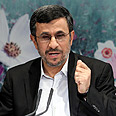
Report: Iran leading cyberwar against US
Iranian government-backed hackers are behind cyberattacks plaguing US targets, officials say
According to the sources, "signatures" left on the attacks allowed US investigators to trace them to the Iranian government. The hackers appear to be a network of fewer than 100 Iranian computer security specialists at universities and network security companies in Iran, investigators said.
Related articles:
- Official: US blames Iran hackers for cyberattacks EU moves closer to new Iran sanctions
- Iran denies hacking into American banks
While detailed evidence linking the attacks to Tehran is classified, the officials said that Iranian hackers don't have the resources to mount major attacks without the government's support and technical expertise.
"These are not ordinary Iranians," one senior US official told the WSJ.
In a major cybersecurity speech on Thursday, Defense Secretary Leon Panetta issued a veiled warning to Tehran that Washington is ready to take preemptive action to protect US computer networks. He didn't directly blame Iran for these attacks, but said they mark "a significant escalation." Panetta outlined procedures being put into place to block such attacks, identify attackers and retaliate.

Leon Panetta (Photo: AP)
In the attacks on US banks, computers were programmed to bombard the institutions' websites and knock them off line. According to the report, investigators fear that these attacks represent a first step to more destructive electronic assaults, like the ones that have already had been mounted on a Saudi oil company.
Retaliation against sanctions?
The attacks began early in 2012, in what is said to be a retaliation for harsh sanctions on Iran's oil and financial sectors meant to halt the Islamic Republic's nuclear program. Tehran denies Western charges that its nuclear program is means to develop atomic weapons.
The Iranian offensive may also be payback for a cybersabotage effort involving the US, which included a virus known as Stuxnet. The project targeted Iran's Natanz nuclear plant with cyberattacks that caused a large proportion of its centrifuges to spin out of control beginning in 2008.
Iran has stepped up its cyber capabilities in recent years, spending at least $1 billion on them since the beginning of this year, the WSJ reported, citing Ilan Berman, a Middle East expert at the American Foreign Policy Council. The Pentagon spends about $3 billion a year on cyberdefenses.
Iran's strategy has shifted from fortifying its cyberdefenses to developing offensive cyberweapons, Berman said.
The attacks expanded to oil and gas companies in the Persian Gulf and Middle East over the summer, then returned to US banks with far more potent attacks in recent weeks.
Three more banks were hit this week, and each of those actions was preceded by an Internet warning of an imminent attack.
"In the last year, there's been a cyberwar going on in the Middle East, and it's spilled over now" into America, a former US official said.
The investigators are looking into the possibility that Iran also played a role in the attacks that targeted the Tel Aviv Stock Exchange and the website of Israeli airline El Al in January.
- Receive Ynetnews updates directly to your desktop










